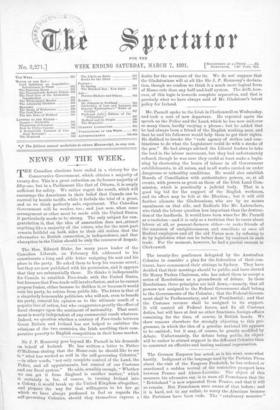Mr. Parnell spoke to the Irish in Clerkenwell on Wednesday,
and took a sort of new departure. He repeated again the speech on the Police and the Land, which he has now said over so many times, hardly varying a phrase ; but be added that he had always been a friend of the English working man, and that he and his followers would help them to get their rights. He disliked to invoke the "rude agency of strikes and com- binations to do what the Legislature could do with a stroke of the pen." He bad always advised the Liberal leaders to take the lead in the labour movement, but they had unfortunately refused, though he was sure they could at least make a begin- ning by shortening the hours of labour in all Government establishments, in all mines, and in all works carried on under dangerous or unhealthy conditions. He would also establish Boards of Conciliation with authoritative powers, or, at all events, with powers as great as those of the Irish Land Com- mission, which is practically a judicial body. That is a good big bid for the support of the English workmen, and its effect may be felt at the Election ; but it will still further alienate the Gladstonians, who are by no moans unanimous on that side, and Radicals like Mr. Labouchere, who think the labour question less important than the destruc- tion of the landlords. It would have been wiser for Mr. Parnell as a tactician—and it is only as a tactician that he cares about labour at all, or peasant-farmers either—to make friends of the mammon of unrighteousness, and conciliate at once all Radical employers and all the old Union men, by refusing to do by legislation what can be better done by contract in each trade. For the moment, however, he had a partial success in Clerkonwell.






































